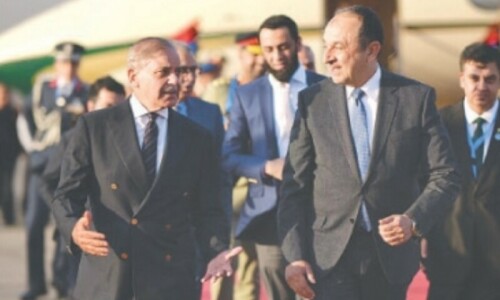KARACHI, Aug 6 The United States and Pakistan lack the required level of trust and personal confidence on nuclear issue and this has led to the recent US-India nuclear deal, says the visiting American scholar, Walter Russell Mead.
The Henry Kissinger Senior Fellow for United States Foreign Policy at the Council on Foreign Relations was specifically asked why Washington did not accept Islamabad's plea for a similar civil nuclear deal with it.
Addressing members of the Pakistan Institute of International Relations (PIIA) on 'Future of American foreign policy', he felt that while US policymakers valued their strategic relations with India as part of their global policy, they might not have taken Pakistan fully on board. He was of the view that US would like to have the level of trust and full accountability with Islamabad for entering that kind of arrangement, implying that despite rendering so much of sacrifice in the ongoing war on terror, the relationship was not so deep-rooted.
In fact, he said, American policymakers felt that they had not been properly taken into confidence on the nuclear issue and there was a lack of personal confidence about the nuclear file. He said that Pakistan government had to take this basic decision.
When asked whether it meant that India had exposed all the nuclear files to US policymakers, the scholar was evasive and his response was not convincing as he justified the deal in the context of American interest and for maintaining strategic balance of power in the evolving global system. He was of the view that India's record on nuclear proliferation was good, despite Tarapur experience and some other examples.
It was his contention that US was trying to have good relations with both India and Pakistan and was also making efforts to ensure that their conflict-ridden relations should not get out of control and they should gradually move towards disarmament. He said if Pakistan felt that it was being neglected or isolated, it would not be in the interest of a lasting peace in the region.
Three Asian giants
The American scholar expressed the view that for the US global plan, the rise of India along with China and growth of Japanese economy would create a power balance in Asia. He said that such a scenario would cut the US spending on maintaining the balance of power on its own. For the US, this would be an ideal situation in the 21st century, he said.
He observed that US options about the rest of Asia kept it engaged in India and the Middle East kept it engaged with Pakistan.
He told a questioner that contrary to general perception, US and China were not heading towards a confrontation and that the rise of India and Japan as economic powers put a limit on China's ability of plying a global role.
In essence, the scholar's analyses pointed at 'contain China policy' be it the Pacific or Asia.
He agreed with a questioner that much of the civilian assistance provided by the US had not reached the common man and it was difficult to verify where the money of American taxpayers had been spent. “That is why there were delays in the release of Kerry-Lugar funds,” he said.
Non-state actors
In reply to a question about terrorism, he said that all states had common interest in restricting the power of non-state actors, and emphasised that this phenomenon had threatened the very foundation of the country (Pakistan).
He also dispelled the impression that US was running Pakistan's affairs, and said “If that was the case, Pakistan would not have been a nuclear power, Dr A. Q. Khan would have been handed over (to the US) long ago, Pakistan would have had universal primary education, we would have worked for arms reduction between Pakistan and India and comfort level would not have been affected.”
Replying to another question about Muslims' plight in the US after the 9/11, he said they were not being discriminated against. “The US is not involved in a crusade against Muslims,” he remarked and in this context, referred to the US role in Bosnia, ending its combat role in Iraq and its efforts towards a political settlement in Afghanistan.
Acknowledging that in such a big country (US) there may have been some incidents, he observed “It is easier to be a Muslim in the US than to be a Christian in Pakistan.” In this context, he referred to blasphemy laws etc.
'Iranian govt not popular'
In his view, the government in Iran was not very popular with the people. “If free and fair elections are held there, people may like to engage with the US. Many Arab countries are concerned about the 'Iranian threat' and urging the US to take firm steps.”
Replying to a question, Mr Mead said on the basis of his experience, he could say that Hamas had a political vision. He explained the reasons why the sentiments in Gaza were different from what were in the West Bank, be that on the issue of a 'two states solution' or some other matters.
In an implied way, he supported Israeli argument on the recent plunder of Gaza by Israelis but at the same time he said the US was working for a lasting solution to the Palestinian-Israeli conflict.
He said that US involvement in the Middle East was not for controlling its oil as it was not dependent on the region's oil. He said that oil should be taken out of geo-political phenomenon. He said that the US was trying to ensure a smooth flow of oil, adding “We don't want oil to be politicized.”











































Dear visitor, the comments section is undergoing an overhaul and will return soon.